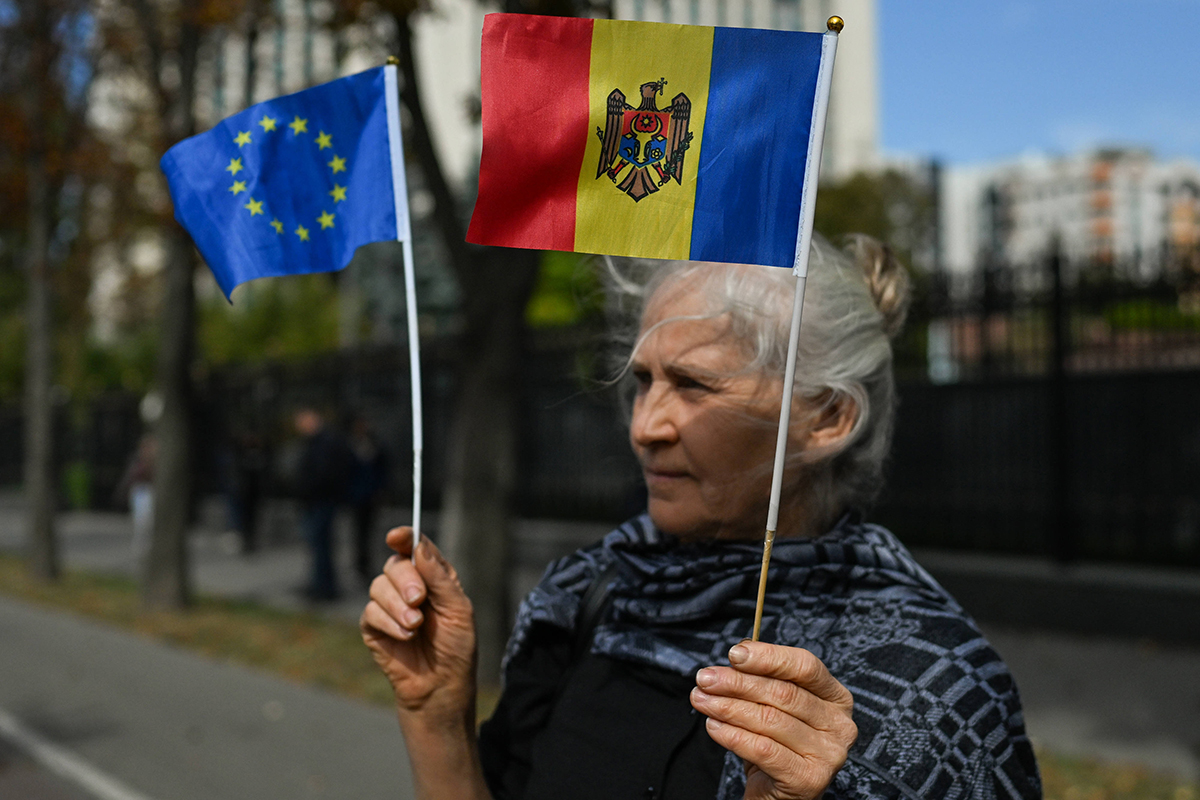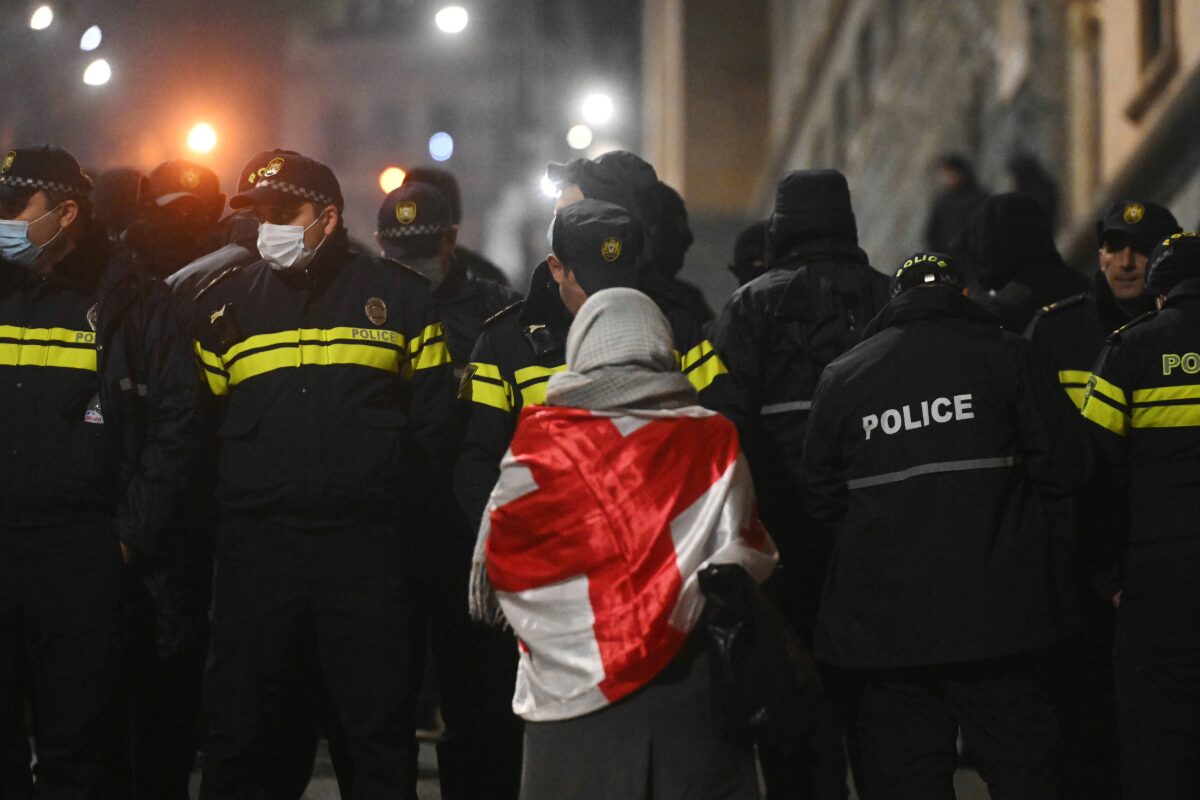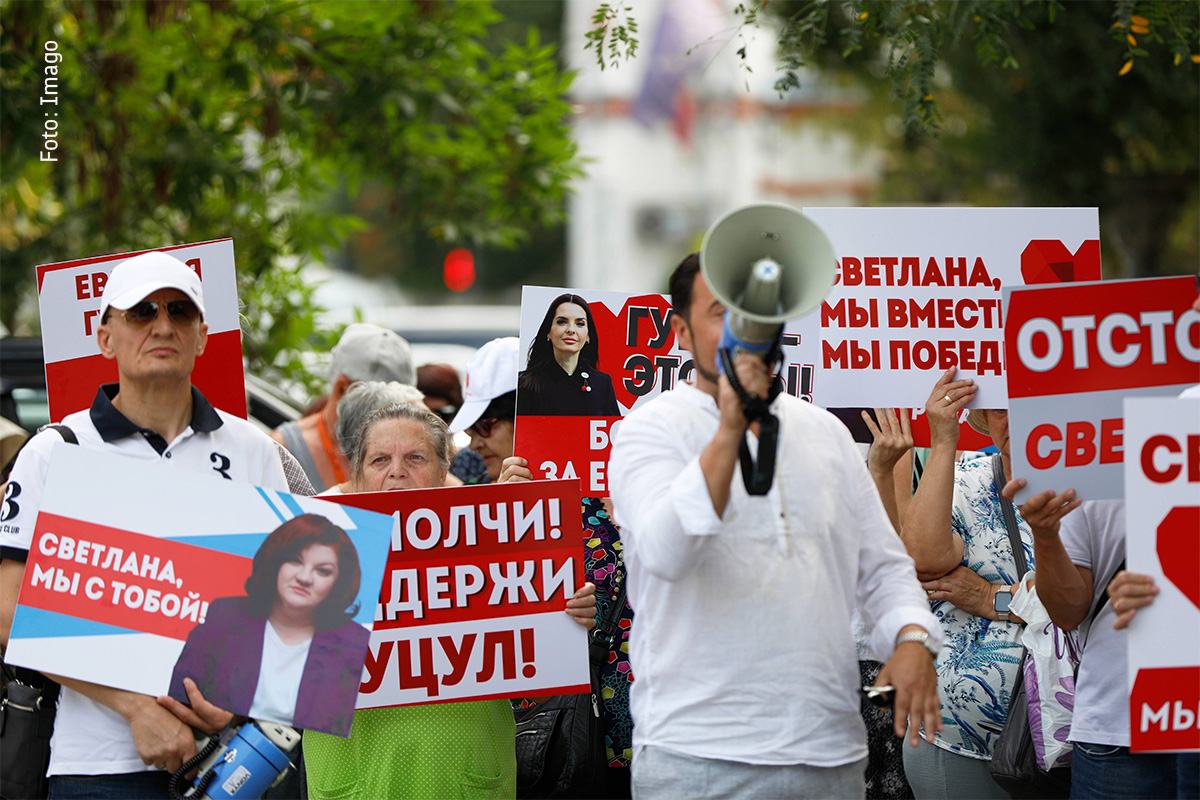The State of De-Oligarchization and Anti-Corruption Reforms in Ukraine

After the EU granted Ukraine candidate status in June 2022, the country is making progress in the areas of anti-corruption and deoligarchization despite the war. In her policy brief, Tetiana Sevchuk analyzes the current state of reforms in Ukraine and what concrete steps are still needed in implementing these EU priorities so that accession negotiations can begin.
Russia’s full-scale war of aggression in Ukraine passed the one-year mark a few months ago. In the face of massive losses of human lives and damage done to critical infrastructure, Ukrainians remain dedicated to the path of Eurointegration and conse- quent democratic transformation of the country. Since the Revolution of Dignity in 2014, Ukraine has made meaningful progress in its fight against corruption and towards greater transparency. The achie- vements in those eight years have signifi- cantly improved the government’s ability to prosecute corruption. Now, the prospect of EU membership presents an opportunity to sustain, reinforce, and strengthen Ukraine’s democratic infrastructure, as it has – thanks to Ukrainians’ unflagging commitment to joining the EU – provided new impetus for democratization and further consolidation of the rule of law.
On the basis of an opinion on Ukraine’s application for membership in the European Union issued by the European Commission (“EC”),[1] the European Council decided to grant the status of candidate country to Ukraine[2] in June 2022. This was on the understanding that Ukraine would fulfil two conditions, which are clearly linked to anti-oligarch and anti-corruption policies:
1) “implement the Anti-Oligarch law to limit the excessive influence of oligarchs in economic, political, and public life; this should be done in a legally sound manner, taking into account the forthcoming opinion of the Venice Commission on the relevant legislation”, and
2) “further strengthen the fight against corruption, in particular at high level, through proactive and efficient investigations, and a credible track record of prosecutions and convictions; complete the appointment of a new head of the Specialised Anti-Corruption Prosecutor’s Office through certifying the identified winner of the competition and launch and complete the selection process and appointment for a new Director of the National Anti-Corruption Bureau of Ukraine.”
Implementation of the “anti-oligarch law”
The Parliament of Ukraine adopted the statute called the “Law on prevention of threats to national security associated with excessive influence of persons who have significant economic and political weight in public life (oligarchs)”, now known as the “anti-oligarch law”, on 23 September 2021. Essentially, this statute grants the National Security and Defence Council, which is headed by the President, the authority to determine which natural persons meet the definition of an oligarch and to examine all contact that any public official has with such persons or representatives thereof (this kind of contact is subject to mandatory reporting by public officials).
The Venice Commission was very critical of the law in its opinion on it,[3] concluding that the law could not be seen as a proper democratic response to the problem of oligarchy. The Commission recommended that the Ukrainian government take action to “legally deter the implementation of the law”; in practical terms, this would mean either suspending the law or postponing its implementation until the situation in the country had stabilized. The Commission recommended a shift of focus to the adoption and implementation of the structural institutional reforms, first and foremost in the sphere of anti-corruption and anti-trust.
The anti-oligarch law was adopted as a political or even rather populist tool in the completely different reality that was pre-war Ukraine. The political, media, and economical landscapes of Ukraine changed enormously after the launch of the full-scale invasion. The role and influence of oligarchs has decreased significantly since then.
Nonetheless, in the absence of adequate oversight and sufficiently capable institutions, a future influx of billions of euros in international aid and investments could create an environment conducive to the capture of wealth and democratic institutions on the part of aspiring and returning oligarchs or other malign economic actors, which would significantly undermine the European future of Ukraine.
Therefore, the fight against oligarchy should not rely on a a non-systematic approach, based on individual decisions by a commission, that involves “naming and shaming” persons whom the executive government has determined to meet the definition of an oligarch, but should instead be advanced through a comprehensive transformation of democratic institutions, geared towards severely reducing the vested interests This transformation should include law enforcement, judicial, political party financing, media, and anti-monopoly reforms.
Strengthening the fight against corruption
The competitive selection procedure for the appointment of a new head of the Specialized Anti-corruption Prosecutor’s Office (“SAPO”) had not yet been complete when the EC issued its opinion on Ukraine’s membership application, although it had reached the final stage, in which the winner would be announced and formally appointed . On 19 July 2022, the selection commission confirmed and announced the name of the successful candidate, Oleksandr Klymenko. Ten days later, Klymenko was appointed as a deputy prosecutor general – and the head of the SAPO. Since then, Klymenko has reconfirmed his independence and established a good track record of investigations, signalling an end to the collective sense of impunity within the Ukrainian establishment.
When the EC opinion was released, the term in office of the first director of the National Anti-corruption Bureau of Ukraine (NABU) had already expired, but the procedure to select a new director had not yet begun. The delay was due to the fact that, in February 2022, when the Cabinet of Ministers approved the selection commission, it had conditioned the participation of one of the members on his withdrawal from selection commission on SAPO that he was serving on. There was no legal basis for setting such a condition, and by doing so, the Cabinet of Ministers may have undermined the entire selection process.[4] Ultimately, the Cabinet amended its initial decree and withdrew this illegal condition, but not until 29 July 2022. The selection commission held its first meeting on 22 August 2022, and the competitive selection procedure was officially announced on 16 November 2022. There were a number of problems associated with the process that ultimately had an impact on the selection of the candidates; however, it should be noted that the competition itself was held in a fair and a transparent manner. In accordance with its legal mandate, the selection commission produced a short-list of three candidates: Semen Kryvonos, Serhii Gupiak, Roman Osypchuk. The selection commission did not provide a clear and grounded opinion as to why these three candidates were best suited to the directorship of NABU, nor did it outline the qualities and competences it viewed as relevant for this post. On 6 March 2023, the Cabinet of Ministers appointed Semen Kryvonos to the post for the next 7 years. The prime minister and the Government did not set out the reasons for their choice either. Still, a new director of NABU was appointed in a competitive selection procedure, so one might conclude that this part of recommendation has also been formally implemented.
The wording of the other part of the EC anti-corruption recommendation, to “further strengthen the fight against corruption, in particular at high level, through proactive and efficient investigations, and a credible track record of prosecutions and convictions” is quite vague. This permits a certain flexibility in understanding the scope of measures being called for, as well as with respect to how the implementation of the recommendation should be assessed. It is believed that compliance with this part of recommendation should be evaluated along two dimensions:
(1) whether the statistics on criminal proceedings on corruption and corruption-related offences (and specifically concerning high-level corruption) show positive trends;
(2) whether Ukrainian authorities have undertaken the legislative and practical measures necessary to ensure that the fight against corruption is strengthened through proactive and efficient investigations and establish a credible track record of prosecutions and convictions.
Other than refraining from interfering in the investigative process, there is little that Ukraine’s political leadership can do to proactively improve the results on this first point, as the statistics in question are determined by the day-to-day work of independent law enforcement and judicial institutions. Ukrainian authorities should introduce a credible and reliable system for the collection of data on criminal proceedings and adjudication of criminal cases on corruption and corruption-related offences to ensure the availability of accurate statistics with which to assess progress along this dimension.
As to second dimension – concrete legislative and practical measures aimed at strengthening the fight against corruption through investigations and establishing a credible track record – a number of the measures necessary in this regard have yet to be implemented. Implementing these will require significant political will.
One of the most relevant and urgent steps needed is the restoration of the obligation to submit asset declarations. These declarations serve as a key source of information for use in detecting of illicit enrichment and unexplained assets, e‑declarations being particularly useful for financial investigations. Relevant legislation, draft law no. 8071, is still pending in Parliament; it was not adopted at the end of the first reading.[5]Several provisions of the draft would need to be revised in order for it to be adopted after the second reading. It is worth noting that Ukraine recently committed to action on this point within the framework of a new IMF program, pledging to “enact the law to restore asset declaration of public officials not directly involved in the mobilization and war efforts and [… reinstate] the NACP’s function to examine and verify them” by end July 2023. [6]
Another priority is strengthening the capacity of Specialized Anti-corruption Prosecutor’s Office (“SAPO”).This will require several changes, including action to: (1) improve the selection procedure for the SAPO leadership to ensure its depoliticization and transparency, as well as the merit-based selection of candidates; (2) strengthen the operational, procedural and organisational autonomy of the SAPO, in particular, by transforming the SAPO into a separate prosecutorial body within the public prosecution system of Ukraine, including the creation of a separate legal entity similar to regional prosecutor’s offices; establish the auxiliary departments necessary for this within the SAPO structure, with autonomous selection of employees; establish guarantees against arbitrary dismissals of SAPO leadership and prosecutors and against the exertion of pressure on them and other improper interference in their activities; Introduce a regulation that provides SAPO with the right to determine the remuneration scale for prosecutors; (3) introduce a procedure for the external independent assessment (audit) of the SAPO’s effectiveness. Draft Law No. 8402 in combination with the additional Draft Laws No. 8403 and 8404, which would introduce amendments to other laws that would be necessary to bring them in line with No. 8402, could be a good starting point for discussion, i.e. they could serve as a basis for further work. However, the Parliamentary Committee on Law Enforcement has recommended that the core piece of legislation involved, Draft Law no. 8402, be rejected. Parliament could overrule this decision. Here, again, it is worth noting that Ukraine recently committed to action in this area within the framework of new IMF program, pledging that “Legislation will be adopted to enhance the institutional autonomy of the SAPO, specifically, on the selection procedures, capacity to regulate organizational activities, and mechanisms for discipline and accountability”.[7]
To sum up, although some progress has been made on implementing this part of the anti-corruption recommendation through the work of SAPO and NABU, Ukraine’s implementation of anti-corruption reforms cannot be said to have been completed. The restoration of asset declarations for public officials and strengthening SAPO appear to be the most important measures, and implementation of these by the autumn of 2023 appears feasible. However, there is no exhaustive list of the changes necessary to strengthen prosecution for corruption. Other necessary legislative and practical measures should be defined in the run up to negotiations on Chapter 23.
[3] https://www.venice.coe.int/webforms/documents/?pdf=CDL-AD(2023)018‑e
[4] https://antac.org.ua/en/news/government-disrupts-nabu-director-competition/.
[5] https://itd.rada.gov.ua/billInfo/Bills/Card/40543.
[6] Memorandum of Economic and Financial Policies, March, 2023, p. 130: https://www.imf.org/en/Publications/CR/Issues/2023/03/31/Ukraine-Request-for-an-Extended-Arrangement-Under-the-Extended-Fund-Facility-and-Review-of-531687.
[7] Ibid, para. 56.
Tetiana Shevchuk is working at the Anti-corruption Action Centre, Ukraine
![]()
Did you like thike this article? If yes, you can support the independent editorial work and journalism of LibMod via a simple donation tool.
Donate via PayPal
![]()
We are recognized as a non-profit organization, accordingly donations are tax deductible. For a donation receipt (necessary for an amount over 200 EUR), please send your address data to finanzen@libmod.de
Related topics
Newsletter bestellen
Stay tuned with our regular newsletter about all our relevant subjects.





